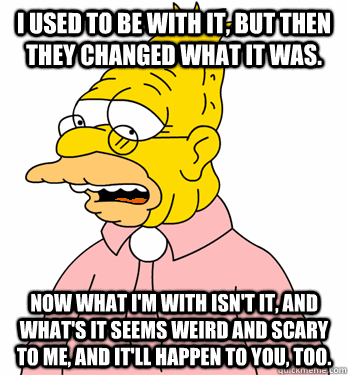When do we stop being interested in new things? What can this teach us about happiness?
.Via Brandwashed: Tricks Companies Use to Manipulate Our Minds and Persuade Us to Buy:
In an attempt to understand why he was musically stuck in the seventies, Sapolsky set out to study “the windows in which we form our cultural tastes, and [in which we] are amenable to new experiences.” Was there, he wondered, an age at which these “windows of openness slammed shut?” Indeed, Sapolsky concluded, there was. He and his research assistants called radio stations that specialize radio stations that specialize in the music of various periods and asked the same two questions of each station manager: When was most of the music that you play first introduced? And what is the average age of your listeners? Based on their responses, Sapolsky found that most of us end up playing and loving the music we’re exposed to when we’re around twenty years old (or younger) for the rest of our lives, and that if a person is over the age of thirty-five when a new pop music style makes its mark, there’s a greater than 95 percent chance he or she will never listen to it. After conducting similar inquiries about food and fashion, he concluded that our “window of openness” for new experiences, like getting our tongue pierced, slams shut at age twenty-three and our openness to trying out new foods (say, sweetbreads or calves’ livers) pretty much closes for good at thirty-nine.
This has been seen before with music.
Via Rob Brooks’ interesting book Sex, Genes & Rock ‘n’ Roll: How Evolution Has Shaped the Modern World:
A recent study by Steve Janssen at the University of Amsterdam shows that the bands and songs people remember most clearly and fondly in middle age are the ones they came to love between the ages of 16 and 21 — late adolescence and early adulthood.
This may be due to how our tastes shift as we age. Young people associate happiness with excitement. Older people connect happiness with peacefulness:
An examination of emotions reported on 12 million personal blogs along with a series of surveys and laboratory experiments shows that the meaning of happiness is not fixed; instead, it systematically shifts over the course of one’s lifetime. Whereas younger people are more likely to associate happiness with excitement, as they get older, they become more likely to associate happiness with peacefulness. This change appears to be driven by a redirection of attention from the future to the present as people age. The dynamic of what happiness means has broad implications, from purchasing behavior to ways to increase one’s happiness.
Source: “The Shifting Meaning of Happiness” from Psychological Science
As we age we stop wanting exciting for the sake of exciting. We want to be happy and so we opt for the things we know have brought those feelings in the past.
This is one of the reasons older people are happier:
…most scientists now think that experience and the mere passage of time gradually motivate people to approach life differently. The blazing-to-freezing range of emotions experienced by the young blends into something more lukewarm by later life, numerous studies show. Older people are less likely to be caught up in their emotions and more likely to focus on the positive, ignoring the negative.
And:
Older people are aware that life doesn’t last forever — and, with a finite amount of time ahead, they think it should be well spent.
In a study at Stanford University’s Center on Longevity, psychologist Laura Carstensen showed that people who perceived their future time as limited had goals that were emotionally meaningful.
Join 25K+ readers. Get a free weekly update via email here.
Related posts:
What are seven things that can make you happier in seven seconds?
What 10 things should you do every day to improve your life?





